SAIC Motor unveils hydrogen strategy plan
According to the plan, Jieqing Technology Co, a high-tech enterprise set up by SAIC Motor to provide fuel cells and engineering services for auto industry, will reach a market value of 10 billion ($1.48 billion) by 2025. It will build a team of more than 1,000 people for fuel cell system research, development and operation to reach the goal of producing and selling 10,000 hydrogen fuel cell vehicles per year.
Sales of SAIC Motor's fuel cell systems are expected to exceed 30,000 by 2025 and this would make the carmaker a leading company in the field. The company aims to become a globally competitive fuel cell vehicle manufacturer with complete independent intellectual property rights in the next decade.

Senior executives of SAIC Motor announce the hydrogen strategy plan at the SAIC Hydrogen Strategy Conference in Shanghai on Sept 13.
SAIC Motor also unveiled the world’s first hydrogen fuel cell MPV called Maxus EUNIQ 7 at the conference, which is equipped with the company’s newly developed third-generation fuel cell system.
Starting from the successful launch of the product, SAIC Motor will promote the mass application of its new generation of autonomous fuel cell technology in heavy trucks, light trucks, buses and other commercial vehicle products based on user scenarios, and launch new fuel cell passenger vehicles in due course.
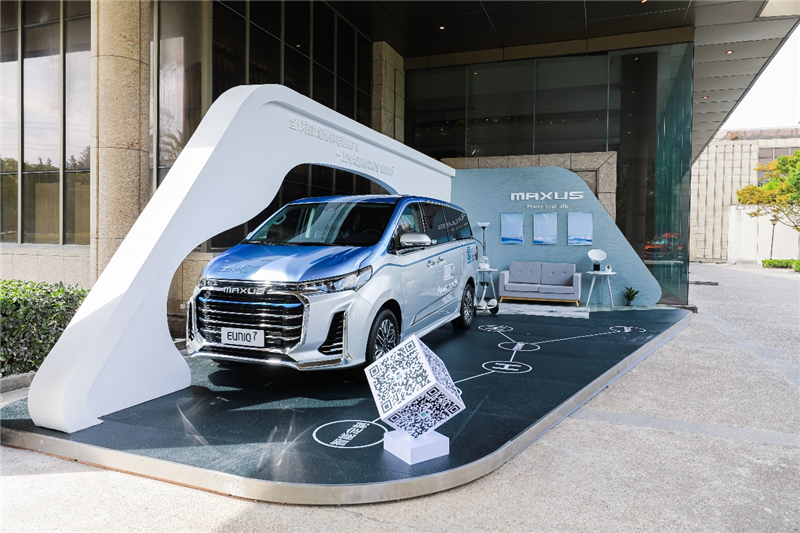
SAIC Motor's first fuel cell MPV, Maxus EUNIQ 7, is unveiled at the SAIC Hydrogen Strategy Conference in Shanghai on Sept 13.
SAIC Motor features world-leading fuel cell technology
SAIC Motor has always adhered to innovative and green development, and is committed to providing users with clean and efficient travel ways to better fulfill its social responsibilities.
As the first Chinese carmaker to develop fuel cell technology, SAIC Motor launched the Phoenix No 1 fuel cell vehicle project in 2001. The company has spent more than 3 billion yuan on research and development over the past two decades. To date, it has obtained 511 fuel cell related patents and participated in the formulation of 15 related national standards.
SAIC Motor’s research and development project of key technologies for fuel cell vehicles won the special prize of the China Automotive Industry Science and Technology Progress Award in 2019.
Its subsidiary Jieqing Technology has mastered the complete capability from the development of core components of fuel cell stack (bipolar plate and membrane electrode), stack integration, fuel cell system integration to power system integration and vehicle integration, and has achieved complete independent intellectual property rights.
The technical indicators such as power, power density and low temperature start of the PROME P390 fuel cell system developed by Jieqing Technology are comparable to the world's top levels represented by Toyota and Hyundai.
The PROME M3H fuel cell stack, which is the core component of the system, has realized independent design and development. All the 58 first-level components achieved fully localization.
SAIC Motor successfully commercializes fuel cell vehicles
SAIC Motor is the only company in the global industry that has achieved commercialization of multiple types of fuel cell vehicles, with a total commercial operation mileage of nearly 5 million kilometers and a cumulative carbon reduction of more than 600 tons, which is equivalent to planting 120,000 trees.
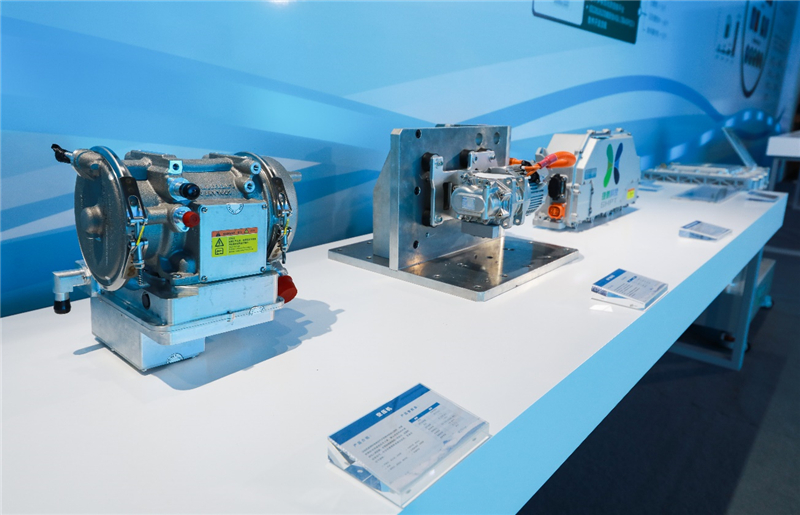
Fuel cells are on display at the SAIC Hydrogen Strategy Conference in Shanghai on Sept 13.
It is one of the first Chinese carmakers to develop fuel cell vehicles. In 2014, SAIC’s Roewe 750 fuel cell vehicle realized its announcement, which is the first of its kind in China. In 2016, Roewe 950 became the first fuel cell sedan to be announced, sold and licensed in China.
In 2017, SAIC MAXUS FCV80 became the first and only commercialized fuel cell wide-body light passenger in China. The vehicles launched trial operation in seven cities, including Shanghai, Fushun, Foshan, Dalian, Wuxi, Changzhi and Qingdao, with a cumulative operating mileage of more than 4 million kilometers.
In particular, the MAXUS FCV80 performed well in Fushun despite two-month extreme cold weather that the average minimum temperature was lower than -20°C and the minimum temperature even reached -30°C.
In 2018, Roewe 950 fuel cell sedan and Sunwin fuel cell buses were selected as designated vehicles for the Promoting China's Fuel Cell Vehicle Commercialization Development Project of the United Nations Development Program.
In 2020, SAIC’s Yuejin fuel cell logistics vehicles and special fuel cell vehicles were announced by the Ministry of Industry and Information Technology.
The world's first fuel cell MPV Maxus EUNIQ 7 officially rolled off the assembly line in June and will come into the market within the year.
SAIC Motor forms ‘hydrogen friend circle’
SAIC Motor has constantly strengthened its cooperation with upstream and downstream partners of the industrial chain, such as parts, hydrogen production, hydrogen transportation, hydrogen storage and hydrogenation, to build the "hydrogen friends circle” in China and jointly promote the overall implementation of the industrial chain.
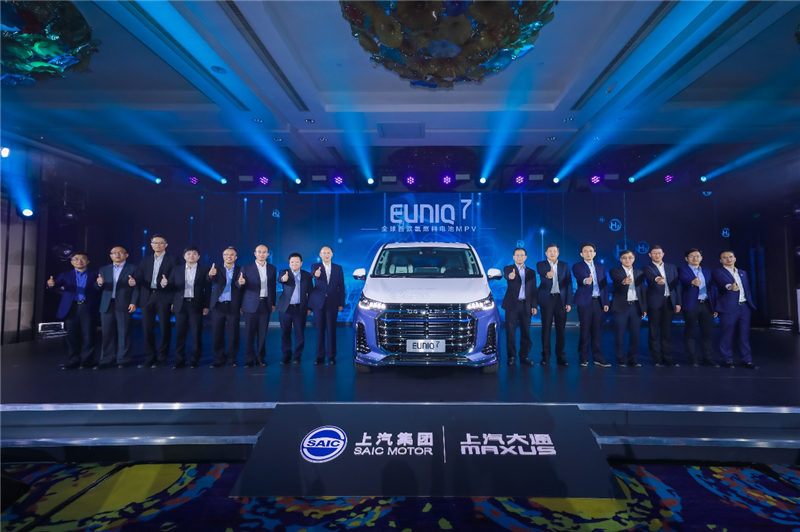
Senior executives witness the world premiere of Maxus EUNIQ 7 at the SAIC Hydrogen Strategy Conference in Shanghai on Sept 13.
In January 2018, SAIC Motor reached a strategic cooperation with Shanghai Chemical Industry Park to jointly promote the demonstration operation and infrastructure construction of hydrogen fuel cell vehicles in the park.
In April 2020, the company and Shanghai Airport Group signed a cooperation agreement. The two parties plans to jointly build hydrogen refueling stations and explore the use of fuel cell vehicles as general-purpose vehicles, passenger shuttle buses, and professional vehicles for other purposes such as ground service, track maintenance and machine maintenance.
In July 2020, it signed a cooperation agreement with China Baowu Steel Group to jointly build a national hydrogen energy industry demonstration zone and promote the development of fuel cell vehicles and hydrogen refueling stations.
In the future, SAIC Motor will work with its cooperative partners to construct platforms such as the hydrogen corridor in the Yangtze River Delta region and the hydrogen energy ecosystem in the Yangtze River Economic Belt.
Relying on the policy support from the country and Shanghai municipal government, the company will continue to improve the economic efficiency of hydrogen fuel production, storage and transportation, promote the construction of new infrastructure and eventually help build a shared hydrogen energy society.
Accelerating the development and application of fuel cell technology is of great significance for enhancing the core competitiveness and international influence of Chinese auto companies in the field of new energy vehicles, promoting the innovative and green development of China's auto industry, as well as enhancing China's energy strategic security.
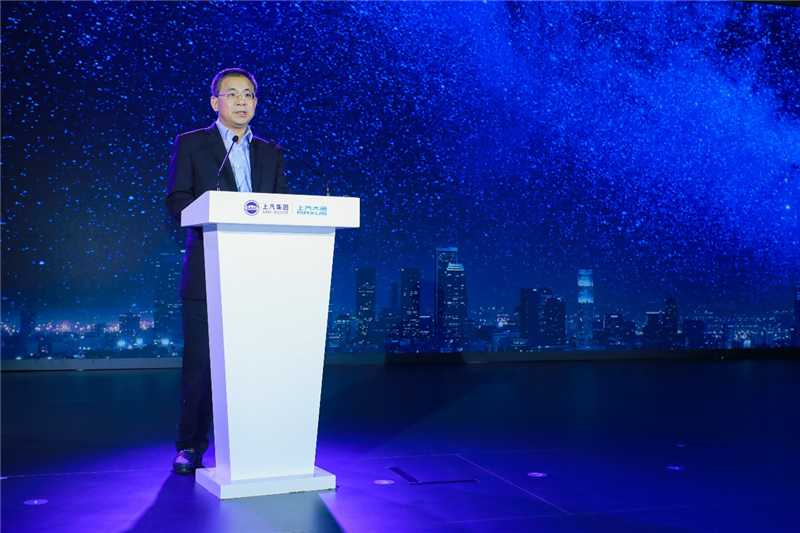
Wang Xiaoqiu, president of SAIC Motor speaks at the SAIC Hydrogen Strategy Conference in Shanghai on Sept 13.
China's auto giant propels energy revolution
As a secondary energy source, hydrogen energy features zero-carbon, high efficiency, energy interconnection media, storable, safe and controllable. It can be promoted and applied in many fields including transportation, industry and construction.
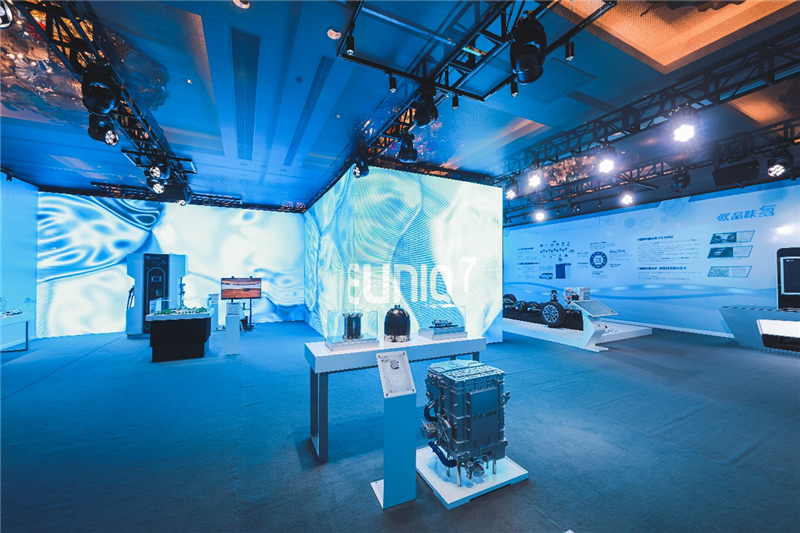
A hydrogen energy-themed exhibition is on display at the SAIC Hydrogen Strategy Conference in Shanghai on Sept 13.
Fuel cell vehicles that use hydrogen as fuel have significant advantages such as pollution-free, high efficiency, high load, fast refueling and long battery life.
Accelerating the development of fuel cell vehicles has become an important part of China’s new energy vehicle strategy.
According to a plan drawn up in 2016 by the Ministry of Industry and Information Technology, China will promote the application of 1 million fuel cell vehicles and build up over 1,000 hydrogen filling stations by 2030.

